- Home
- Christopher Moore
Practical Demonkeeping pc-1 Page 4
Practical Demonkeeping pc-1 Read online
Page 4
Rivera memorized the license number of the old Ford truck parked outside The Breeze’s trailer. He would run it through the computer when he got back to the station. Maybe he could convince the captain that he still had something. Maybe he did. And then again, maybe he could just climb a stream of angel piss to heaven.
-=*=-
Rivera sat in the file room of the sheriff’s office drinking coffee and watching a videotape. After running the license number through the computer, Rivera found that the pickup belonged to a Robert Masterson, age twenty-nine. Born in Ohio, married to Jennifer Masterson, also twenty-nine. His only prior was a drunk-driving conviction two years ago.
The video was a record of Masterson’s breathalyzer test. Several years ago the department had begun taping all breathalyzer tests to avoid legal-defense strategies based on procedural mistakes made by arresting officers during testing.
On the television screen a very drunk Robert W. Masterson (6 ft., 180 lbs., eyes green, hair brown) was spouting nonsense to two uniformed deputies.
“We work for a common purpose. You serve the state with your minds and bodies. I serve the state by opposing it. Drinking is an act of civil disobedience. I drink to end world hunger. I drink to protest the United States’ involvement in Central America. I drink to protest nuclear power. I drink…”
A sense of doom descended on Rivera as he watched. Unless The Breeze reappeared, his career was in the hands of this tightly wound, loosely wrapped, drunken idiot. He wondered what life might be like as a bank security guard.
On the screen the two officers looked away from their prisoner to the door of the testing room. The camera was mounted in the corner and fitted with a wide-angle lens to cover anything that happened without having to be adjusted. A little Arab man in a red stocking cap had come through the door, and the deputies were telling him that he had the wrong room and to please leave.
“Could I trouble you for a small quantity of salt?” the little man asked. Then he blinked off the screen as if the tape had been stopped and he had been edited out.
Rivera rewound the tape and ran it again. The second time, Masterson performed the test without interruption. The door did not open and there was no little man. Rivera ran it back again: no little man.
He must have dozed off while the tape was running. His subconscious had continued the tape while he slept, inserting the little man’s entrance. That was the only viable explanation.
“I don’t need this shit,” he said. Then he ejected the tape and drained his coffee, his tenth cup of the day.
5 AUGUSTUS BRINE
He was an old man who fished off the beaches of Pine Cove and he had gone eighty-four days without catching a fish. This, however, was of little consequence because he owned the general store and made a comfortable enough living to indulge his passions, which were fishing and drinking California wines.
Augustus Brine was old, but he was still strong and vital and a dangerous man in a fight — although he had had little cause to prove it in over thirty years (except for the few occasions when he picked up a teenage boy by the scruff of the neck and dragged him, terrified, to the stockroom, where he lectured him alternately on the merits of hard work and the folly of shoplifting from Brine’s Bait, Tackle, and Fine Wines). And while a weariness had come upon him with age, his mind was still sharp and agile. On any evening one might find him stretched out before his fireplace in a leather chair, toasting his bare feet on the hearth, reading Aristotle, or Lao-tzu, or Joyce.
He lived on a hillside overlooking the Pacific, in a small wooden house he had designed and built himself, so that he might live there alone without having his surroundings seem lonely. During the day, windows and skylights filled the house with light, and even on the most dismal, foggy day, every corner was illuminated. In the evening three stone fireplaces, which took up whole walls in the living room, bedroom, and study, warmed the house. They offered a soft, orange comfort to the old man, who burned cord after cord of red oak and eucalyptus, which he cut and split himself.
When he considered his own mortality, which was seldom, Augustus Brine knew he would die in this house. He had built it on one floor with wide halls and doorways so that if he were ever confined to a wheelchair he might remain self-sufficient until the day when he would take the black pill sent to him by the Hemlock Society.
He kept the house neat and orderly. Not so much because he desired order, for Brine believed chaos to be the way of the world, but because he did not wish to make life difficult for his cleaning lady, who came in once a week to dust and shovel ashes from the fireplaces. He also wished to avoid acquiring the reputation of being a slob, for he knew people’s propensity for judging a man on one aspect of his character, and even Augustus Brine was not above some degree of vanity.
Despite his belief that the pursuit of order in a chaotic universe was futile, Brine lived a very ordered life, and this paradox, upon reflection, amused him. He rose each day at five, indulged himself in a half-hour-long shower, dressed, and ate the same breakfast of six eggs and half a loaf of sourdough toast, heavily buttered. (Cholesterol seemed too silent and sneaky to be dangerous, and Brine had decided long ago that until cholesterol gathered its forces and charged him headlong across the plate with Light Brigade abandon, he would ignore it.)
After breakfast, Brine lit his meerschaum pipe for the first time of the day, crawled onto his truck, and drove downtown to open his store.
For the first two hours he puffed around the store like a great white-bearded locomotive, making coffee, selling pastries, trading idle banter with the old men who greeted him each morning, and preparing the store to run under full steam until midnight, under the supervision of a handful of clerks. At eight o’clock the first of Brine’s employees arrived to man the register while Brine busied himself ordering what he called Epicurean necessities: pastries, imported cheeses and beers, pipe tobacco and cigarettes, homemade pasta and sauces, freshly baked bread, gourmet coffees, and California wines. Brine believed, like Epicurus, that a good life was one dedicated to the pursuit of simple pleasures, tempered with justice and prudence. Years ago, while working as a bouncer in a whorehouse, Brine had repeatedly seen depressed, angry men turned to gentleness and gaiety by a few moments of pleasure. He had vowed then to someday open a brothel, but when the ramshackle general store with its two gas pumps had been put up for sale, Brine had compromised his dream by buying it and bringing pleasure of a different sort to the public. From time to time, however, a needling suspicion arose in his mind that he had missed his true calling as a madam.
Each day when the orders were finished, Brine selected a bottle of red wine from his shelves, packed it in a basket with some bread, cheese, and bait, and took off for the beach. He passed the rest of the day sitting on the beach in a canvas director’s chair sipping wine and smoking his pipe, waiting for the long surf-casting rod to bend with a strike.
On most days Brine let his mind go as clear as water. Without worry or thought he became one with everything around him, neither conscious nor unconscious: the state of Zen mushin, or no-mind. He had come to Zen after the fact, recognizing in the writings of Suzuki and Watts an attitude he had come to without discipline, by simply sitting on the beach staring into an empty sky and becoming just as empty. Zen was his religion, and it brought him peace and humor.
On this particular morning Brine was having a difficult time clearing his mind. The visit of the little Arab man to the store vexed him. Brine did not speak Arabic, yet he had understood every word the little man had said. He had seen the air cut with swirling blue curses, and he had seen the Arab’s eyes glow white with anger.
He smoked his pipe, the meerschaum mermaid carved so that Brine’s index finger fell across her breasts, and tried to apply some meaning to a situation that was outside the context of his reality. He knew that if he were to accept the fluid of this experience, the cup of his mind had to be empty. But right now he had a better chance of buying bread with moonlight t
han reaching a Zen calm. It vexed him.
“It is a mystery, is it not?” someone said.
Startled, Brine looked around. The little Arab man stood about three feet from Brine’s side, drinking from a large styrofoam cup. His red stocking cap was glistening, damp with the morning spray.
“I’m sorry,” Brine said. “I didn’t see you come up.”
“It is a mystery, is it not? How this dashing figure seems to appear out of nowhere? You must be awestruck. Paralyzed with fear perhaps?”
Brine looked at the withered little man in the rumpled flannel suit and silly red hat. “Very close to paralyzed,” he said. “I am Augustus Brine.” He extended his hand to the little man.
“Are you not afraid that by touching me you will burst into flames?”
“Is that a danger?”
“No, but you know how superstitious fishermen are. Perhaps you believe that you will be transformed into a toad. You hide your fear well, Augustus Brine.”
Brine smiled. He was baffled and amused; it didn’t occur to him to be afraid.
The Arab drained his cup and dipped it into the surf to refill it.
“Please call me Gus,” Brine said, his hand still extended. “And you are?”
The Arab drained his cup again, then took Brine’s hand. His skin had the feel of parchment.
“I am Gian Hen Gian, King of the Djinn, Ruler of the Netherworld. Do not tremble, I wish you no harm.”
“I am not trembling,” Brine said. “You might go easy on that seawater — it works hell on your blood pressure.”
“Do not fall to your knees; there is no need to prostrate yourself before my greatness. I am here in your service.”
“Thank you. I am honored,” Brine said. Despite the strange happenings in the store, he was having a hard time taking this pompous little man seriously. The Arab was obviously a nuthouse Napoleon. He’d seen hundreds of them, living in cardboard castles and feasting from dumpsters all over America. But this one had some credentials: he could curse in blue swirls.
“It is good that you are not afraid, Augustus Brine. Terrible evil is at hand. You will have to call upon your courage. It is a good sign that you have kept your wits in the presence of the great Gian Hen Gian. The grandeur is sometimes too much for weaker men.”
“May I offer you some wine?” Brine extended the bottle of cabernet he had brought from the store.
“No, I have a great thirst for this.” He sloshed the cup of seawater. “From a time when it was all I could drink.”
“As you wish.” Brine sipped from the bottle.
“There is little time, Augustus Brine, and what I am to tell you may overwhelm your tiny mind. Please prepare yourself.”
“My tiny mind is steeled for anything, O King. But first, tell me, did I see you curse blue swirls this morning?”
“A minor loss of temper. Nothing really. Would you have had me turn the clumsy dolt into a snake who forever gnaws his own tail?”
“No, the cursing was fine. Although in Vance’s case the snake might be an improvement. Your curses were in Arabic, though, right?”
“A language I prefer for its music.”
“But I don’t speak Arabic. Yet I understood you. You did say, ‘May the IRS find that you deduct your pet sheep as an entertainment expense,’ didn’t you?”
“I can be most colorful and inventive when I am angry.” The Arab flashed a bright grin of pride. His teeth were pointed and saw-edged like a shark’s. “You have been chosen, Augustus Brine.”
“Why me?” Somehow Brine had suspended his disbelief and denied the absurdity of the situation. If there was no order in the universe, then why should it be out of order to be sitting on the beach talking to an Arab dwarf who claimed to be king of the Djinn, whatever the hell that was? Strangely enough, Brine took comfort in the fact that this experience was invalidating every assumption he had ever made about the nature of the world. He had tapped into the Zen of ignorance, the enlightenment of absurdity.
Gian Hen Gian laughed. “I have chosen you because you are a fisherman who catches no fish. I have had an affinity for such men since I was fished from the sea a thousand years ago and released from Solomon’s jar. One gets ever so cramped passing the centuries inside a jar.”
“And ever so wrinkled, it would seem,” Brine said.
Gian Hen Gian ignored Brine’s comment. “I found you here, Augustus Brine, listening to the noise of the universe, holding in your heart a spark of hope, like all fishermen, but resolved to be disappointed. You have no love, no faith, and no purpose. You shall be my instrument, and in return, you shall gain the things you lack.”
Brine wanted to protest the Arab’s judgment, but he realized that it was true. He’d been enlightened for exactly thirty seconds and already he was back on the path of desire and karma. Postenlightenment depression, he thought.
6
THE DJINN’S STORY
Brine said, “Excuse me, O King, but what exactly is a Djinn?”
Gian Hen Gian spit into the surf and cursed, but this time Brine did not understand the language and no blue swirls cut the air.
“I am Djinn. The Djinn were the first people. This was our world long before the first human. Have you not read the tales of Scheherazade?”
“I thought those were just stories.”
“By Aladdin’s lamplit scrotum, man! Everything is a story. What is there but stories? Stories are the only truth. The Djinn knew this. We had power over our own stories. We shaped our world as we wished it to be. It was our glory. We were created by Jehovah as a race of creators, and he became jealous of us.
“He sent Satan and an army of angels against us. We were banished to the netherworld, where we could not make our stories. Then he created a race who could not create and so would stand in awe of the Creator.”
“Man?” Brine asked.
The Djinn nodded. “When Satan drove us into the netherworld, he saw our power. He saw that he was no more than a servant, while Jehovah had given the Djinn the power of gods. He returned to Jehovah demanding the same power. He proclaimed that he and his army would not serve until they were given the power to create.
“Jehovah was sorely angered. He banished Satan to hell, where the angel might have the power he wished, but only over his own army of rebels. To further humiliate Satan, Jehovah created a new race of beings and gave them control over their own destinies, made them masters of their own world. And he made Satan watch it all from hell.
“These beings were parodies of the angels, resembling them physically, but with none of the angels’ grace or intelligence. And because he had made two mistakes before, Jehovah made these creatures mortal to keep them humble.”
“Are you saying,” Brine interrupted, “that the human race was created to irritate Satan?”
“That is correct. Jehovah is infinite in his snottiness.”
Brine reflected on this for a moment and regretted that he had not become a criminal at an early age. “And what happened to the Djinn?”
“We were left without form, purpose, or power. The netherworld is timeless and unchanging, and boring — much like a doctor’s waiting room.”
“But you’re here, you’re not in the netherworld.”
“Be patient, Augustus Brine. I will tell you how I came here. You see, many years passed on Earth and we remained undisturbed. Then was born Solomon the thief.”
“You mean King Solomon? Son of David?”
“The thief!” The Djinn spat. “He asked for wisdom from Jehovah that he might build a great temple. To assist him, Jehovah gave him a great silver seal, which he carried in a scepter, and the power to call the Djinn from the netherworld to act as slaves. Solomon was given power over the Djinn on Earth that by all rights belonged to me. And as if that was not enough, the seal also gave him the power to call up the deposed angels from hell. Satan was furious that such power be given to a mortal, which, of course, was Jehovah’s plan.
“Solomon called first upon
me to help him build his temple. He spread the temple plans before me and I laughed in his face. It was little more than a shack of stone. His imagination was as limited as his intelligence. Nevertheless, I began work on his temple, building it stone by stone as he instructed. I could have built it in an instant had he commanded it, but the thief could only imagine a temple being built as it might be built by men.
“I worked slowly, for even under the reign of the thief, my time on Earth was better than the emptiness of the netherworld. After some time I convinced Solomon that I needed help, and I was given slaves to assist me in the construction. Work slowed even more, for while some of them worked, most stood by and chatted about their dreams of freedom. I have seen that such methods are used today in building your highways.”
“It’s standard,” Brine said.
“Solomon grew impatient with my progress and called from hell one of the deposed angels, a warrior Seraph named Catch. Thus did his troubles begin.
“Catch had once been a tall and beautiful angel, but his time in hell, steeping in his own bitterness, had changed him. When he appeared before Solomon, he was a squat monster, no bigger than a dwarf. His skin was like that of a snake, his eyes like those of a cat. He was so hideous that Solomon would not allow him to be seen by the people of Jerusalem, so he made the demon invisible to all but himself.
“Catch carried in his heart a loathing for humans as deep as Satan himself. I had no quarrel with the race of man. Catch, however, wanted revenge. Fortunately, he did not have the powers of a Djinn.
“Solomon told the slaves who worked on the temple that they were being given divine assistance and that they should behave as if nothing was out of the ordinary, so the people of Jerusalem might not notice the demon’s presence. The demon threw himself into the construction, honing huge blocks of stone and hauling them into place.

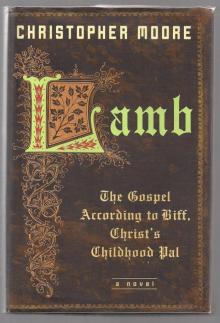 Lamb: The Gospel According to Biff, Christs Childhood Pal
Lamb: The Gospel According to Biff, Christs Childhood Pal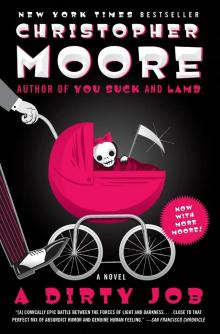 A Dirty Job
A Dirty Job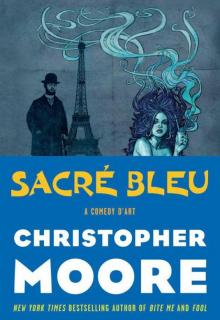 Sacré Bleu
Sacré Bleu Bite Me: A Love Story
Bite Me: A Love Story You Suck: A Love Story
You Suck: A Love Story Bloodsucking Fiends: A Love Story
Bloodsucking Fiends: A Love Story The Stupidest Angel
The Stupidest Angel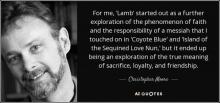 Coyote Blue
Coyote Blue The Lust Lizard of Melancholy Cove
The Lust Lizard of Melancholy Cove Secondhand Souls
Secondhand Souls Shakespeare for Squirrels
Shakespeare for Squirrels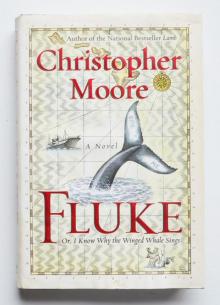 Fluke, or, I Know Why the Winged Whale Sings
Fluke, or, I Know Why the Winged Whale Sings Island of the Sequined Love Nun
Island of the Sequined Love Nun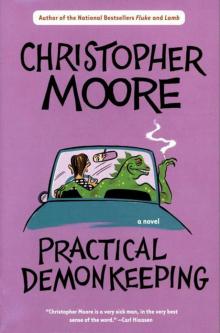 Practical Demonkeeping
Practical Demonkeeping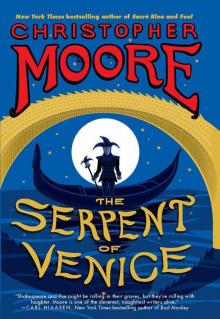 The Serpent of Venice
The Serpent of Venice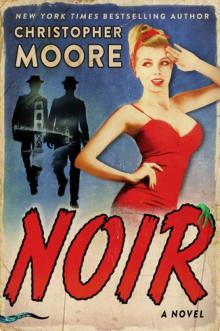 Noir
Noir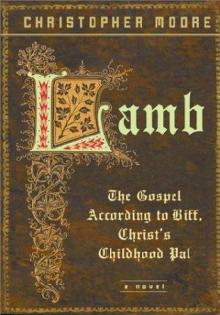 Lamb: The Gospel According to Biff, Christ’s Childhood Pal
Lamb: The Gospel According to Biff, Christ’s Childhood Pal Bite Me
Bite Me Bloodsucking Fiends
Bloodsucking Fiends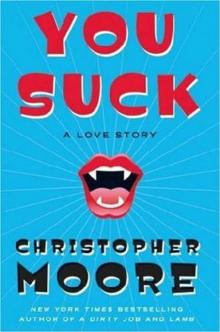 You Suck ls-2
You Suck ls-2 Bloodsucking Fiends ls-1
Bloodsucking Fiends ls-1 The Stupidest Angel: A Heartwarming Tale of Christmas Terror
The Stupidest Angel: A Heartwarming Tale of Christmas Terror The Lust Lizard of Melancholy Cove pc-2
The Lust Lizard of Melancholy Cove pc-2 You Suck
You Suck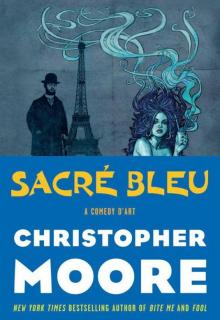 Sacre Bleu: A Comedy d'Art
Sacre Bleu: A Comedy d'Art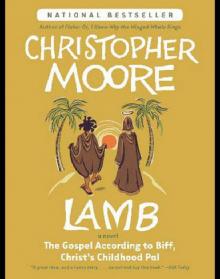 Lamb
Lamb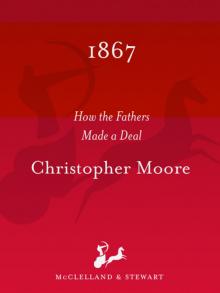 1867
1867 Bite Me ls-3
Bite Me ls-3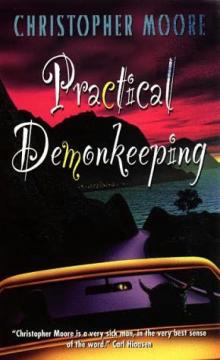 Practical Demonkeeping pc-1
Practical Demonkeeping pc-1